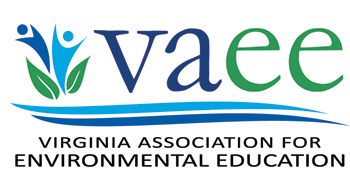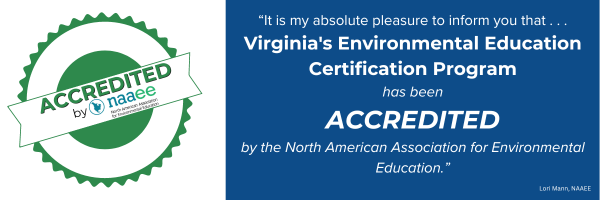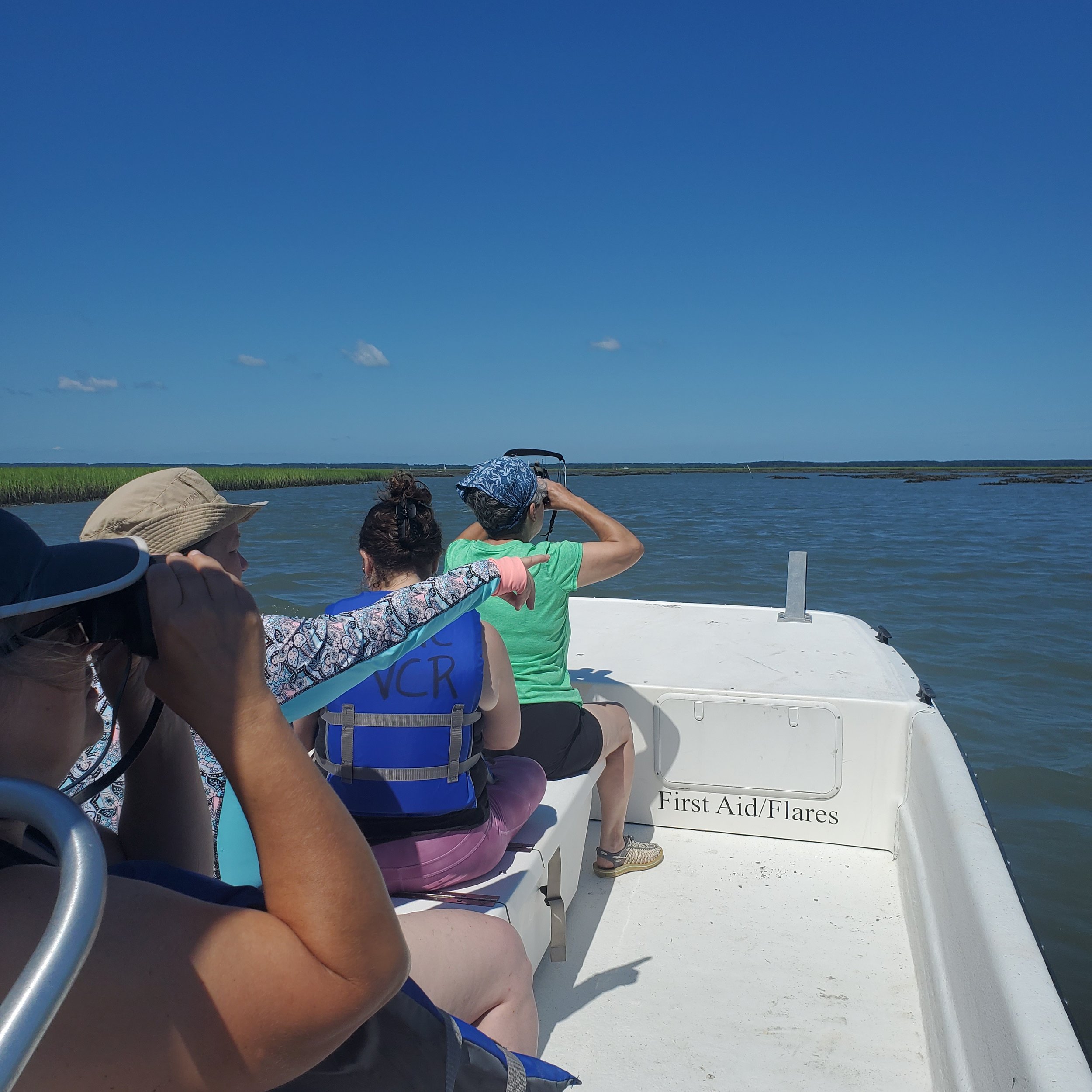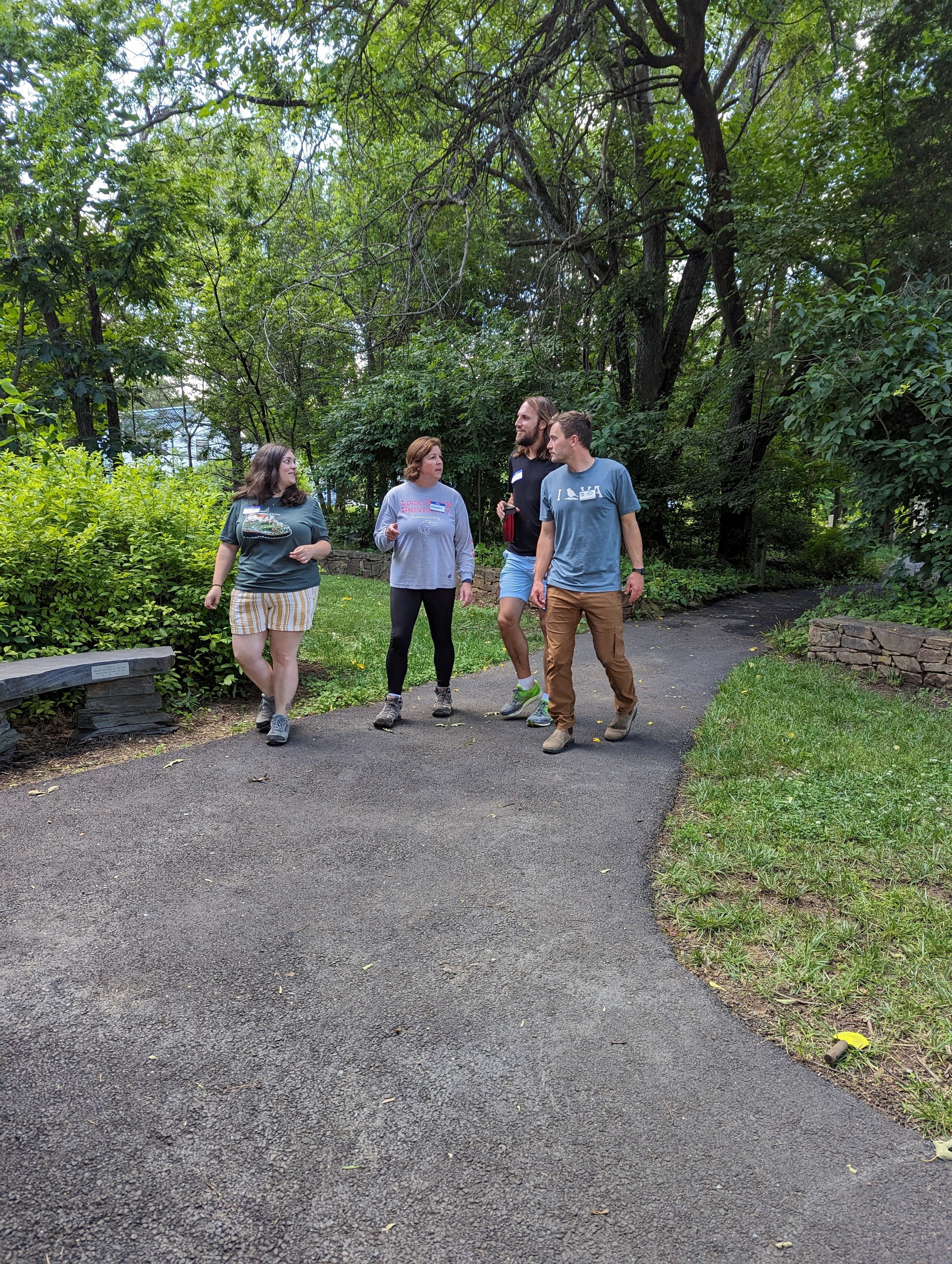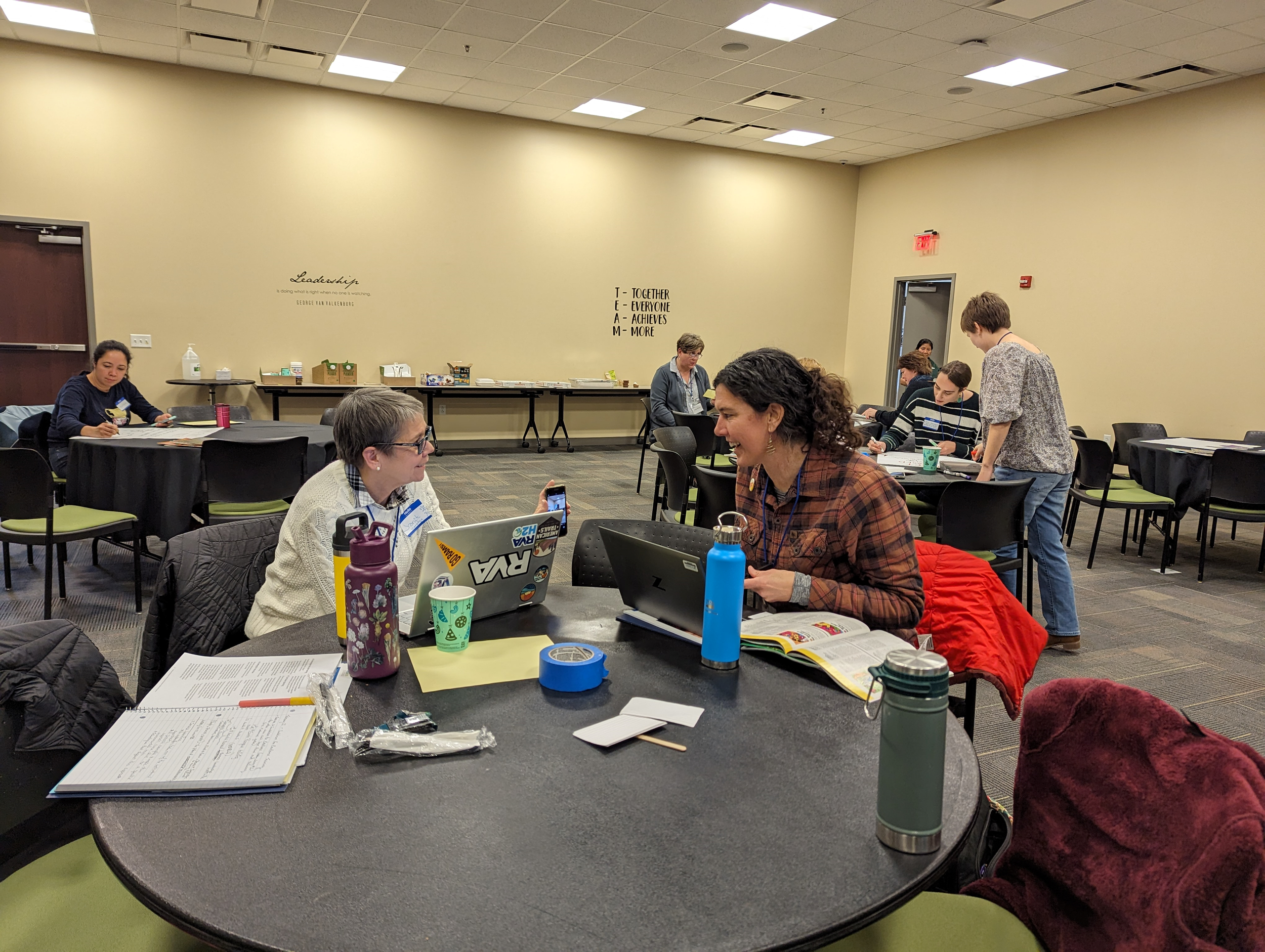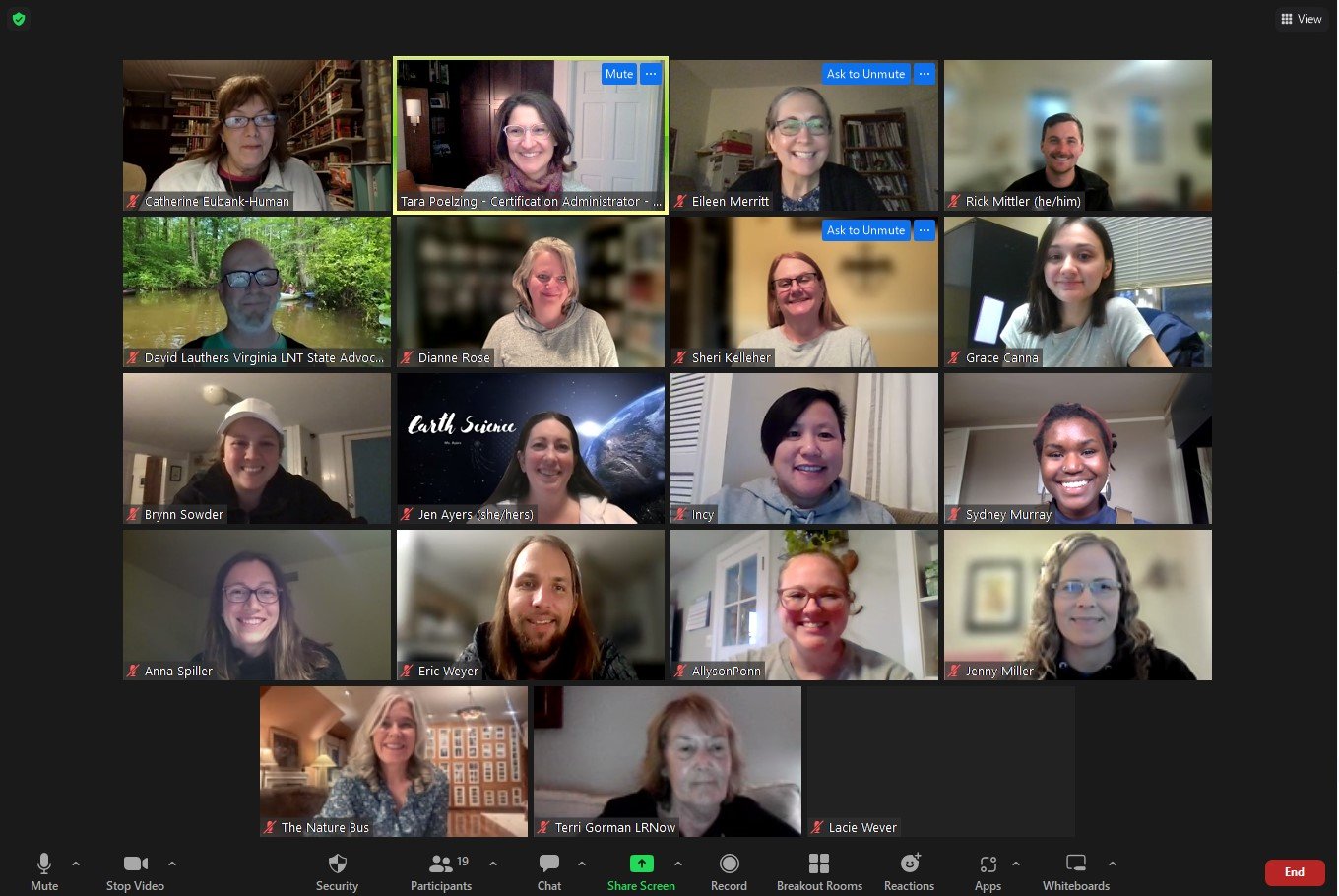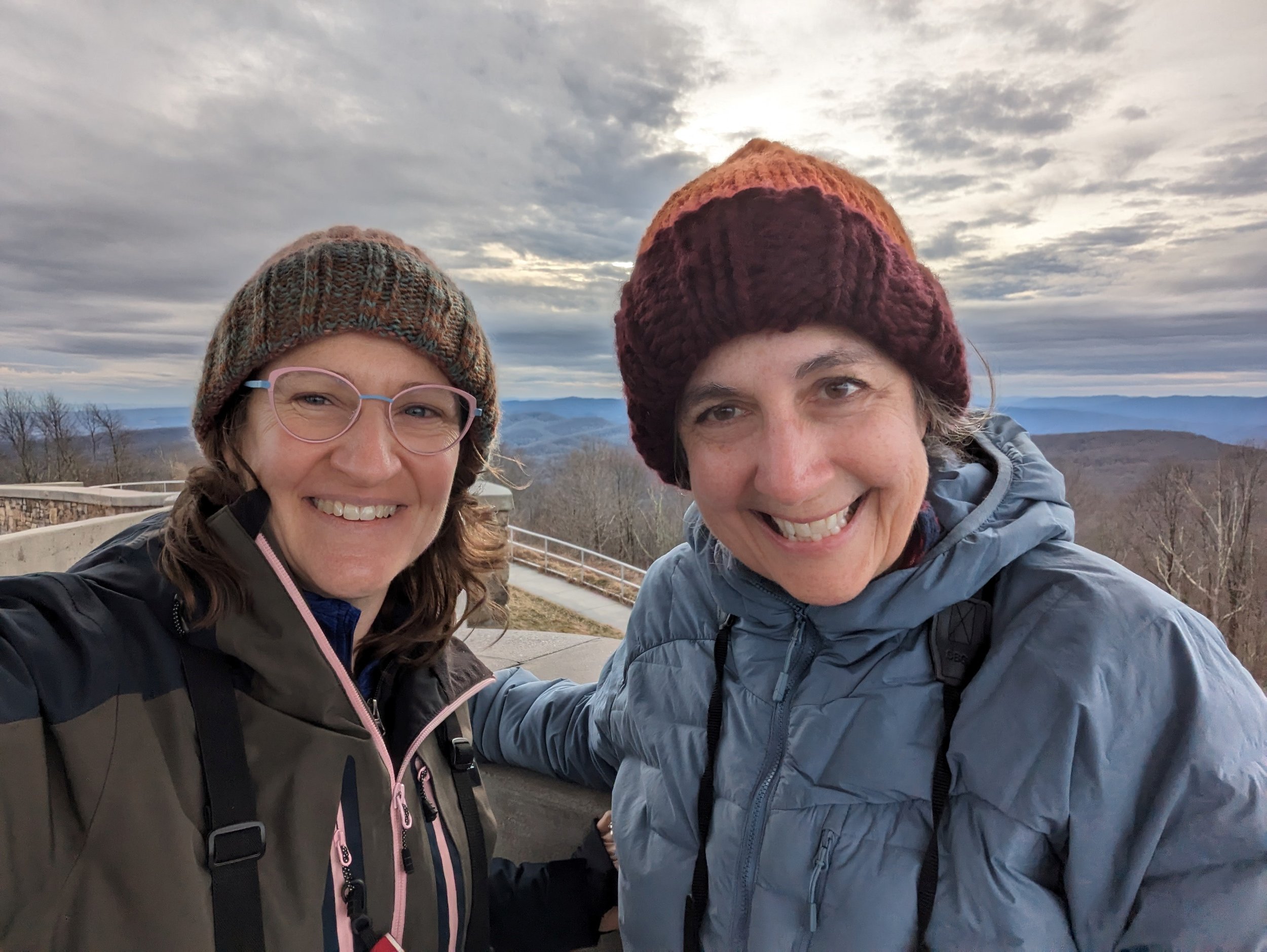Virginia’s Environmental Education Certification Program Earns Accreditation
Tara Poelzing, March 2024
Virginia Certified Environmental Educators can now claim the distinction of graduation from an
Accredited EE Certification Program.
In November 2016, when Virginia’s state Office of Environmental Education closed, many projects were left homeless, and development of the Environmental Education Certification Program was facing the chopping block. “I remember a room full of dedicated individuals at our VAEE Annual Meeting trying to salvage programs and making the hard decisions about which ones just couldn’t be saved,” says Tara Poelzing, Certification Administrator. After some cajoling, certification development, which was still in its infancy, made the cut, and the long process of building the program began.
So many passionate professionals moved the ball forward, and a number of other state affiliates also shared their own work and advice. The cast evolved over time due to changing work and life responsibilities and as the requirements of the Certification Advisory Board (CAB), which officially formed in 2017, changed. As the CAB built the program, themes emerged. We knew we wanted a stronger focus on inclusion and environmental justice than NAAEE required; the program needed to be robust; accessibility was essential; and building community would be an important sustaining measure. Some of the greatest challenges in program planning came from balancing all of these factors.
“We have had so many iterations [of the CAB], so many people have helped to push the process forward. It has not been easy, but it has been so worth the effort. Moving to clarify what the definition of professional Environmental Education is, and putting in the work to state precisely what the best practices and fundamental requirements are for certification adds value to all of us who are involved in EE.“
John Lord, CAB Chair
Slow but steady won the race, and after an infusion of VAEE’s first part-time paid staff in late 2020, our Certification Administrator, the Certification Program officially launched in January 2022. Generous financial support from the Virginia Environmental Endowment for the last two years along with funding assistance to support our Guidelines for Excellence workshops from NAAEE’s ee360+ program helped to nudge the program towards readiness for the next big step, applying for accreditation.
Now, about three months after VAEE applied to the North American Association for Environmental Education for accreditation, the Certification Program has been awarded the distinction of Accredited Environmental Education Certification Program.
Especially of note is snagging this accomplishment on the first round of application which is not a common occurrence.
NAAEE’s standards are rigorous and focus on a competency-based program requiring highly qualified leaders and instructors, clear policies, continued and meaningful assessment and overall program evaluation, as well as inclusive, equitable, and accessible practices. In short, national accreditation is a significant accomplishment.
“It is so wonderful to see Virginia turn green on the NAAEE state map!! It has been joyful and challenging work to be a part of the CAB during this exciting time. One thing I'm especially proud of is our collaborative work to develop a core competency focused on advancing diversity, equity, inclusion, social justice and environmental justice through environmental education. We have much work to do, but we now have some clear goals to strive toward together.”
Eileen Merrit, CAB Member
But why all the trouble? What could cause volunteers to dedicate so much of their time and talents. “Environmental education is a discipline that, done well, builds critical thinkers and problem solvers. Today’s environmental challenges are huge, and if we are going to tackle them, we need people in all walks of life who can see an issue, see the big picture, break it down, and problem solve with solid background knowledge. Those are the learners who come out of our educators’ experiences,” says Poelzing. In addition, as our Executive Director, Bianca Myrick notes, “Accreditation on a statewide level means recognizing the importance of environmental education and its impact on life and learning beyond the classroom similar to other disciplines." In short, it matters, and everyone reading this knows that!
Today, the Certification Program has 59 candidates enrolled with one graduated Certified Environmental Educator. “We are at an exciting time where we are going to start seeing candidates wrapping up their self-paced work and graduating. Virginia Certified Environmental Educator is now becoming a designation of note as more and more educators who have completed this rigorous program will energize both the EE work and volunteer forces.”
Candidates in the Certification Program represent the multitude of ways that we teach about our environment, yet this diverse group of educators welcomes everyone, and then they learn from each other. Amanda Kelley joined the program just a couple of months ago to bolster her work at the Southeast Action Rural Community Assistance Project (SERCAP) based in Roanoke. “Since I am not an environmental educator in a formal setting such as a school I was a little nervous that I would feel a bit out of place in the program. It has been great to see the wide variety of backgrounds and experience everyone is bringing in with them. I have felt welcomed and it seems like everyone just wants to increase the passion for and amount of EE that is accessible to people in the state.”
Eric Weyer fulfills his passion for connecting people to their natural world and finding ways to make choices that support the health and well-being of our intertwined human and environmental systems by serving in a volunteer capacity for a number of organizations but, chiefly, through Virginia Master Naturalists. He got to know this growing community along the way: “I did not expect that learning from and connecting with other educators would be a large part of the program, and it’s been a wonderful surprise. Between our in-person and virtual workshops, the absolutely wonderful experience with the Nature Conservancy on Virginia’s Eastern Shore, and the recent VAEE conference in Manassas, I feel like I really got a chance to connect with people and learn a multitude of different approaches that I can integrate within my practice.”
That Eastern Shore trip that Eric mentions resulted from Jennifer Miller, another certification candidate, thinking about how creating an experience at her workplace, The Nature Conservancy’s Volgenau Virginia Coast Reserve, could provide an important opportunity for fellow candidates in the program. “I think one of the most surprising things is how involved in the program I have become to really connect with other educators around the state and share with them what the Eastern Shore of Virginia has to offer. At first I felt like I would learn a lot and just get in and out and be done with it and say “I’m certified” and use all this new knowledge, but I’ve really enjoyed taking on a more active role and hope to continue connecting other educators with the Shore as well as other work TNC does around the state.”
It turns out that the Certification Program is full of surprises. Since a number of educators come to EE either from a strictly education background, a science background, or from a passion for the work, many have not been formally trained in EE. “This is one of the main reasons that we (the CAB) were so passionate about building this program for Virginia. Educators across the Commonwealth are giving their all to the field, but with the combination of foundational knowledge, established best practices, and the latest research, we could level up our impact,” says Poelzing. Candidates speak to this experience as well. Kathleen Herron, a teacher in Fairfax County Public Schools, states that upon joining the program, “I quickly learned that I didn’t know much about Environmental Education or what it really was,” but her teaching has evolved. “When I teach lessons about Environmental Education, I make a conscious effort to circle back to 1) How does this affect our local community/ ecosystem and/or 2) Why would this be happening in the first place.” That deeper dive helps her learners to see our connections to the vast systems in our environment and to look at the broader picture so that they can see how our intertwining systems are working and then find the myriad of optional solutions that are there.
The skills learned in this program are even serving candidates outside of their work in direct education. Sydney Murray recently moved into the position of Conference and Communications Coordinator for Natural Start Alliance. She states, “Even though I'm not currently active in the field as an educator, this certification program has equipped me with so much insight on what makes for quality environmental educational experiences across all age groups - and that's very relevant to my new work still.”
“I am thrilled that Virginia’s Environmental Education Certification Program is serving our candidates in so many ways. The work of environmental educators—growing problem solvers who have the skills to analyze real-world data and the compassion to address environmental injustices—is intricate. EE is not easy. We can’t simply make statements that our learners memorize and then turn around and share with others. We have to help our learners to see and understand complexity. If this program can support our educators in developing their teaching toolboxes while also encouraging a community of educators that will support one another in this work, then we have done what we intended to do,” says Tara Poelzing.
““My aspirations for the certification program include continued relationship bridging and building that will foster increased recognition by local school divisions, universities, businesses, and organizations. Many professionals are recognized by their employers for achieving certifications in other fields, so I would hope that we are able to continue to elevate the field of environmental education in a similar way.””
Circling back to how this story began, VAEE holds so much gratitude for the force of volunteers who have nourished this program into being the strong professional learning opportunity that it is today. “This is a big lift” is one phrase that was spoken many times during development. Indeed, thousands of volunteer hours made this possible. The dedication of environmental educators is a thing to behold.
"Seeing the news about our accreditation made me tear up. I have served on the CAB since 2018 and no other professional group I have served with has been as determined, motivated and deeply connected to the work as the CAB. By working on the certification program, I have expanded my own environmental education knowledge and skills plus gained lifelong friends from across Virginia. It's amazing what people can do when they are laser focused on a goal. We joked from the beginning that all we had to do was keep working because we just needed it to be 'a thing.' And now our ‘thing’ is nationally accredited!"
Meredeth Dash, CAB Member
